Britain Condemns Hanging Of Two Iranian Protesters
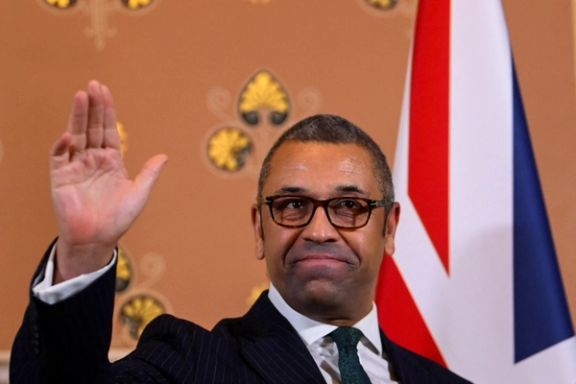
The United Kingdom has slammed Iran's execution of two protesters Saturday and urged the regime to "immediately end the violence against its own people".

The United Kingdom has slammed Iran's execution of two protesters Saturday and urged the regime to "immediately end the violence against its own people".
The country’s Foreign Minister James Cleverly in a tweet said, "The execution of Mohammad Mahdi Karami and Seyed Mohammad Hosseini by the Iranian regime is abhorrent."
"The UK is strongly opposed to the death penalty in all circumstances," he added.
Iran hanged the two men for allegedly killing a member of the security forces during nationwide protests that were triggered following the death of 22-year-old Kurdish woman Mahsa Amini in police custody in September.
The convictions were not based on a criminal charge related to the murder per se, but they were charged with ‘moharebeh’, meaning “war against God”, a vague religious concept. The Islamic Republic applies the charge to people who might get into a confrontation with security forces during protests.
Despite widespread international attempts to stop the executions, the regime decided to implement the verdict reached in November. Officials say death sentences for three others in the same case have been canceled.
So far, the government has executed four protesters and nearly a dozen others have received the death penalty, some for much less charges than murder, while at least 100 protesters face charges that could end in death sentences for them, an Iranian human rights group based in Oslo has reported.
Dozens of prisoners are either on hunger strike or suffer from life-threatening illnesses that are not treated by prison authorities and some are deprived of life-saving medications.
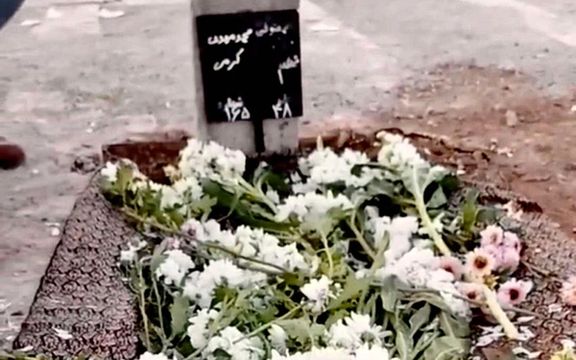
A host of Western officials have condemned the executions of two protesters in Iran Saturday while French senators urged strong measures against the regime.
The European Union in a statement Saturday condemned the execution of Mohammad Mehdi Karami and Seyyed Mohammad Hosseini in Iran and called the executions “yet another sign of the Iranian authorities’ violent repression of civilian demonstrations” and urged Iranian government to “strictly abide by their obligations enshrined in the International Covenant on Civil and Political Rights” to which Iran is a party.
“The European Union calls once again on the Iranian authorities to immediately end the strongly condemnable practice of imposing and carrying out death sentences against protesters,” the EU said and called on Tehran to “annul without delay the recent death penalty sentences that were already pronounced in the context of the ongoing protests and to provide due process to all detainees.”
Condemning the executions and calling them “abhorrent”, British foreign minister James Cleverly urged the Islamic Republic to "immediately end the violence against its own people". "The UK is strongly opposed to the death penalty in all circumstances," Cleverly said.
US Special Envoy for Iran Rob Malley tweeted, “Appalled by the regime’s execution of two more young Iranians after sham trials. These executions must stop. We and others across the globe will continue to hold Iran’s leadership accountable.”
French senators have tabled a resolution calling on the EU for ending nuclear negotiations with Iran and designating the Revolutionary Guards (IRGC) as a terrorist organization.
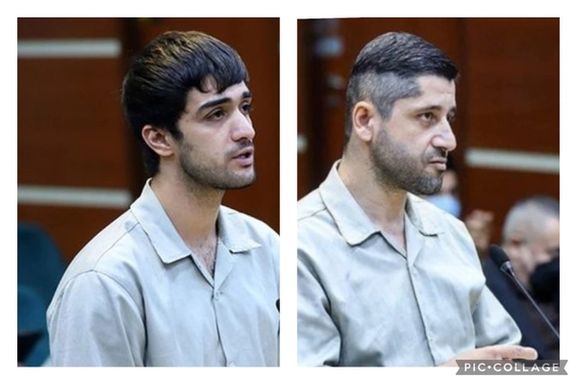
“Over 40 senators have supported the motion that requires the European Union to end the talks to restore the 2015 nuclear deal (JCPOA), list the IRGC as a terrorist organization, and shut down Iranian banks in the EU countries and close its airspace to Iranian flights for fundamental human rights violations,” Senator Nathalie Goulet who proposed the motion with her colleagues in the upper house of the French Parliament told Iran International.
The European affairs committee of the Senate will be working on this resolution over the next ten days, she added.
The resolution calls on the Government and the European Union to “consolidate and extend the limitation of access to the primary and secondary capital markets of the Union for Iranian banks, including those established on the territory of the European Union.”
It also calls on the European Union to expel students in the EU who have a family link with Iranian officials on the list of Persons Subject to Restrictive Measures for Serious Human Rights Violations in Iran.
Other European lawmakers, some of whom have accepted the political sponsorship of some of several detained Iranian protesters including those with a death penalty hanging over their heads strongly condemned Saturday’s hangings of, Karami and Hosseini, urging their governments to adopt restrictive measures against Iran for its violation of human rights.
Helge Limburg, the German lawmaker who accepted Karami’s political sponsorship in a tweet said he could not express his deep “sadness and rage” over his execution while French lawmaker Clementine Autain who also sponsored Karami in a tweet strongly criticized the French President Emanuel Macron for his “silence vis-à-vis the [Islamic Republic] regime.”
Norbert Röttgen, member of the German Parliament (Bundestag) in a tweet after the executions said Germany and the EU must “finally start taking decisive action to protect the 19k other prisoners” while another German MP, Hannah Neumann, in a tweet said the regime “will not stop with more talks and red carpets”. “We need to send a clear signal and treat them as what they are: terrorists,” she added.
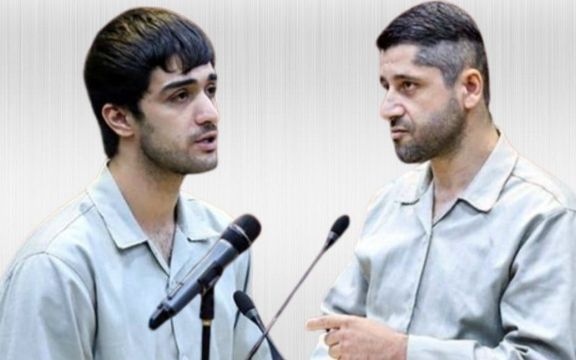
Iranian rights defenders say that if the world does not put more pressure on Iran's regime, it will kill more protesters after two young men were hanged Saturday.
The Oslo-based Iran Human Rights Organization called the execution of Mohammad Mehdi Karami, 22, and Mohammad Hosseini, 39 was a "criminal act" and warned of "massive executions of protesters" if there is no "adequate response from the international community".
Both men were arrested for the killing of a Basij militiaman named Ruhollah Ajamian during the protests on November 3 in Karaj west of Tehran.
Canada-based activist Hamed Esmaeilion said in a tweet Saturday that “terrorists of the Islamic Republic murdered two innocent young men without access to the lawyers and behind closed doors. The time has come to expel their ambassadors.”
British-Iranian actress and human rights activist Nazanin Boniadi also condemned the executions saying, “Shame on the global community and leaders for not stopping the Islamic Republic’s atrocities.”
Masih Alinejad, another rights activist, also said in a tweet, "In our occupied land, our loved ones are being executed for chanting for freedom, for protesting against poverty, corruption and brutality."
Two protestors named Mohsen Shekari and Majidreza Rahnavard were executed in Tehran and Mashhad in December.
Following mass arrests of protestors in the last four months and hasty death sentences issued for 11 people in sham trials, human rights activists and some foreign officials have been calling for weeks to hold the Islamic Republic accountable.

New figures show that due to extensive internet and social network restrictions, 20 percent of people in Iran have lost their online jobs in the past four months.
According to Jobvision website, the restriction imposed on Iranians’ access to social networks following nationwide protests has resulted in a series of undesirable consequences such as cutbacks, increased uncertainty about the future, reduced salaries, and the suspension of development plans.
The website published a chart showing that 46 percent of organizations have suspended or postponed more than half of their recruitment programs due to the recent internet restrictions.
45% of companies or businesses that depend on the Internet have decided to reduce their payments or had to pay wages by delay.
The statistical findings of Jobvision show one out of every five people have lost their jobs, and 16% of those working in this area expect to be fired soon.
Restrictions on Instagram has had a deep impact on the lives of people who used to make a living on this popular social network.
The government often shuts of slows down access to the Internet and social media platforms, while President Ebrahim Raisi promised in his election campaign that he would not block Instagram because "it is the place of business for many Iranians".
Since the beginning of nationwide protests almost four months ago, the government has cracked down on protests violently, and officials have repeatedly blamed cyberspace and foreign media for provoking the protesters.

Prime Minister Justin Trudeau has reaffirmed Canada's commitment to pursue justice for the “senseless” deaths of those onboard an airliner downed by Iran in 2020.
Trudeau made the comments in a meeting with family members of victims of Ukraine International Airlines Flight PS752 that was shot down by Iran’s Revolutionary Guard on January 8, 2020.
Mélanie Joly, Minister of Foreign Affairs, Omar Alghabra, Minister of Transport and Ralph Goodale, High Commissioner in the United Kingdom were also present in the meeting which was held on the anniversary of the tragic event.
A statement published by Global Affairs Friday said, “Canada honors the victims of Flight PS752 and all air disasters and continues to stand in solidarity with their families and loved ones.”
“Canada and its partners in the Coordination Group—Sweden, Ukraine and the United Kingdom—continue to work together to hold Iran accountable for the downing of Flight PS752 and ensure full reparations are made for the deaths of 176 innocent people,” reads the statement.
On December 28, 2022, the Coordination Group of countries affected by the tragic incident announced an important step in the pursuit of accountability in accordance with international law. Members of the group Britain, Canada, Sweden, and Ukraine urged Iran to agree to arbitration as Tehran has stonewalled over an independent investigation and proper compensation.
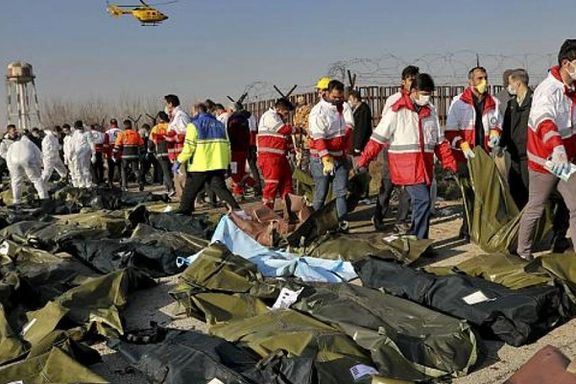
The airliner was shot down by two air-defense missiles fired by the IRGC as it took off from Tehran’s Imam Khomeini International Airport. Hours earlier, the IRGC had fired more than a dozen missiles at Iraqi bases hosting US troops in retaliation for the killing of the IRGC Quds Force Commander Ghasem Soleimani who was targeted by a US drone strike just five days earlier.
All 176 passengers and crew, including 63 Canadians and 10 from Sweden, as well as 82 Iranian citizens on the plane died in the disaster.
Iranian activist groups have called for large rallies both in Iran and abroad on Sunday, January 8 to mark the third anniversary of the incident, coupled with ongoing antigovernment protests.
The execution of two more protesters in Iran on Saturday may add to the intensity of the gatherings on Sunday.
The Canadian Broadcasting Corporation reported January 6 that Ottawa is weighing the options regarding claims that Iran’s envoy to International Civil Aviation Organization (ICAO), Farhad Parvaresh might have had involvements with Iran’s Revolutionary Guard.
Parvaresh is currently based in Canada and some are demanding that the federal government impose restrictions on his movements.
Parvaresh was the head of government airline, Iran Air during the years when the company’s aircraft were used to transport weapons to Syria, a task organized and controlled by IRGC’s extraterritorial Quds (Qods) Force.
In a confidential audio recording obtained by Iran International in April 2021, former foreign minister Javad Zarif told an Iranian journalist that Iran Air was extensively used to ferry weapons to Damascus. The authenticity of the long audio recording was not disputed. Zarif’s reference was to early and mid-2010s, when Parvaresh headed Iran Air.
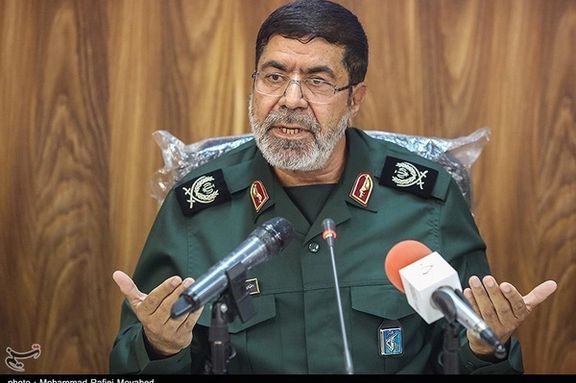
Iran's Revolutionary Guard spokesman Ramazan Sharif says Supreme Leader Ali Khamenei sought to support Palestinian militias against Israel through Quds Force.
He said that Ali Khamenei had asked former commander of Qods (Quds) force Ghasem Soleimani to empower the resistant front, a term the Islamic Republic uses for its proxy groups across the region.
Sharif said in remarks this week that a wave of anti-Israeli sentiments in the third and fourth generation of Palestinians, not only in the Gaza Strip but also in the West Bank, was achieved "thanks to Soleimani," without elaborating on how.
However, many documented reports and statements by Iranian officials in the past show that Tehran is the main financial and military backer of Hezbollah and has also provided substantial support to Palestinian militant groups and the Houthis in Yemen.
He added that the Supreme Leader had also assigned Soleimani to supporting the Lebanese Hezbollah, which led to the “victories” of the group.
On January 3, 2020, the US military, on the order of former President Donald Trump, killed Soleimani in a drone strike near Baghdad International Airport, saying that he had been "actively developing plans to attack American diplomats and service members in Iraq and throughout the region."
In a tweet on the occasion of the third anniversary of the targeted killing of Soleimani by the US, the Iranian Foreign Ministry renewed the regime’s pledges to avenge his death, saying the US killing of the former IRGC's Quds Force commander in 2020 failed in bringing Washington its desired outcome.